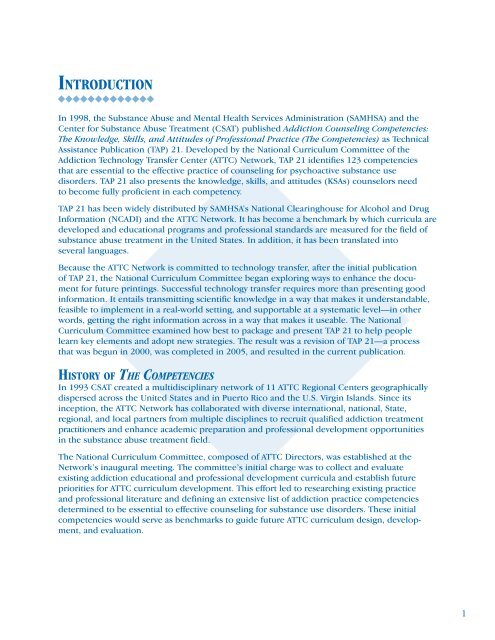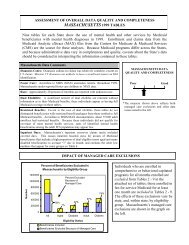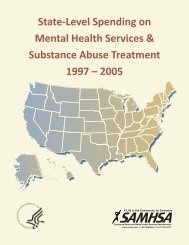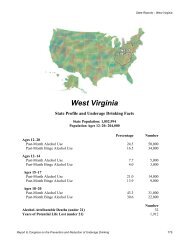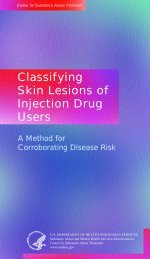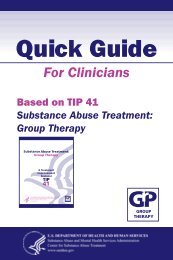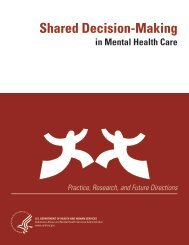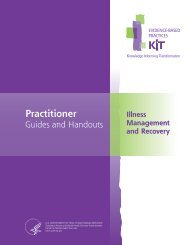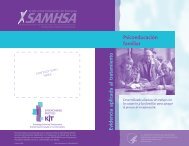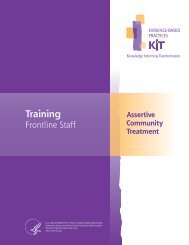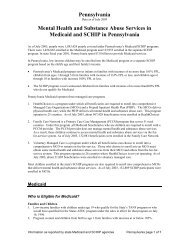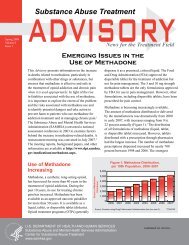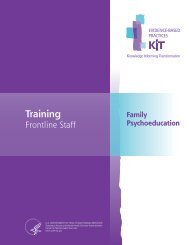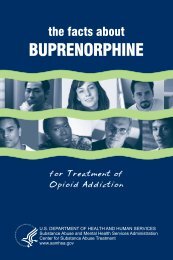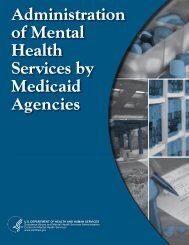TAP 21 - SAMHSA Store - Substance Abuse and Mental Health ...
TAP 21 - SAMHSA Store - Substance Abuse and Mental Health ...
TAP 21 - SAMHSA Store - Substance Abuse and Mental Health ...
Create successful ePaper yourself
Turn your PDF publications into a flip-book with our unique Google optimized e-Paper software.
Introduction<br />
In 1998, the <strong>Substance</strong> <strong>Abuse</strong> <strong>and</strong> <strong>Mental</strong> <strong>Health</strong> Services Administration (<strong>SAMHSA</strong>) <strong>and</strong> the<br />
Center for <strong>Substance</strong> <strong>Abuse</strong> Treatment (CSAT) published Addiction Counseling Competencies:<br />
The Knowledge, Skills, <strong>and</strong> Attitudes of Professional Practice (The Competencies) as Technical<br />
Assistance Publication (<strong>TAP</strong>) <strong>21</strong>. Developed by the National Curriculum Committee of the<br />
Addiction Technology Transfer Center (ATTC) Network, <strong>TAP</strong> <strong>21</strong> identifies 123 competencies<br />
that are essential to the effective practice of counseling for psychoactive substance use<br />
disorders. <strong>TAP</strong> <strong>21</strong> also presents the knowledge, skills, <strong>and</strong> attitudes (KSAs) counselors need<br />
to become fully proficient in each competency.<br />
<strong>TAP</strong> <strong>21</strong> has been widely distributed by <strong>SAMHSA</strong>’s National Clearinghouse for Alcohol <strong>and</strong> Drug<br />
Information (NCADI) <strong>and</strong> the ATTC Network. It has become a benchmark by which curricula are<br />
developed <strong>and</strong> educational programs <strong>and</strong> professional st<strong>and</strong>ards are measured for the field of<br />
substance abuse treatment in the United States. In addition, it has been translated into<br />
several languages.<br />
Because the ATTC Network is committed to technology transfer, after the initial publication<br />
of <strong>TAP</strong> <strong>21</strong>, the National Curriculum Committee began exploring ways to enhance the document<br />
for future printings. Successful technology transfer requires more than presenting good<br />
information. It entails transmitting scientific knowledge in a way that makes it underst<strong>and</strong>able,<br />
feasible to implement in a real-world setting, <strong>and</strong> supportable at a systematic level—in other<br />
words, getting the right information across in a way that makes it useable. The National<br />
Curriculum Committee examined how best to package <strong>and</strong> present <strong>TAP</strong> <strong>21</strong> to help people<br />
learn key elements <strong>and</strong> adopt new strategies. The result was a revision of <strong>TAP</strong> <strong>21</strong>—a process<br />
that was begun in 2000, was completed in 2005, <strong>and</strong> resulted in the current publication.<br />
History of The Competencies<br />
In 1993 CSAT created a multidisciplinary network of 11 ATTC Regional Centers geographically<br />
dispersed across the United States <strong>and</strong> in Puerto Rico <strong>and</strong> the U.S. Virgin Isl<strong>and</strong>s. Since its<br />
inception, the ATTC Network has collaborated with diverse international, national, State,<br />
regional, <strong>and</strong> local partners from multiple disciplines to recruit qualified addiction treatment<br />
practitioners <strong>and</strong> enhance academic preparation <strong>and</strong> professional development opportunities<br />
in the substance abuse treatment field.<br />
The National Curriculum Committee, composed of ATTC Directors, was established at the<br />
Network’s inaugural meeting. The committee’s initial charge was to collect <strong>and</strong> evaluate<br />
existing addiction educational <strong>and</strong> professional development curricula <strong>and</strong> establish future<br />
priorities for ATTC curriculum development. This effort led to researching existing practice<br />
<strong>and</strong> professional literature <strong>and</strong> defining an extensive list of addiction practice competencies<br />
determined to be essential to effective counseling for substance use disorders. These initial<br />
competencies would serve as benchmarks to guide future ATTC curriculum design, development,<br />
<strong>and</strong> evaluation.<br />
1


